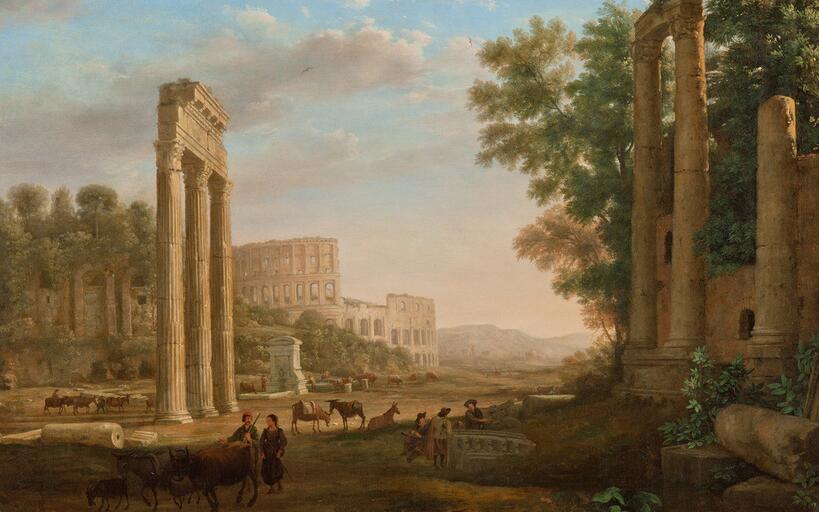The conquest of Greece in the second century BC
在公元前二世纪征服希腊以后
reintroduced Romans to Greek culture, or Hellenism,
罗马重新极大地接触了
in a much greater way. The term Hellenism describes a
希腊文化,或者说叫古希腊文化
culture adapted from the classical Ancient Greeks and
古希腊文化该词指由古典古希腊发源
spread through the Eastern Mediterranean and
并通过马其顿征服者亚历山大大帝

the Near East by the conquests of one Alexander
传播到东地中海和近东
the Great of Macedonia. Even after Alexander's empire
甚至在亚历山大帝国瓦解后
crumbled, and after the Romans conquered the empires
罗马人政府亚历山大后继者的帝国后
of Alexander's successors, Alexander's Hellenistic ways
亚历山大的古希腊方式和
and customs took root and survived. Roman soldiers
习俗还是生根发芽
who had experienced Hellenistic life came back home
罗马战士经历过古希腊的生活回到家后
describing luxuries on a scale previously unimaginable
描述它的奢华
to a culture steeped in the mos maiorum. Greeks
程度上对于祖制里的文化是不可想象的
reclined at dinner instead of sitting bolt upright,
希腊人斜躺着吃饭,而不是坐得直直狼吞虎咽
Greek homes were comfortable and attractively designed,
希腊人的家很舒适而且设计得很吸引人
Greeks worshipped in huge, beautiful temples and
希腊人崇敬巨大的,美丽的寺庙
attended dramatic performances in giant theaters
喜欢坐在巨大的剧院里看戏剧
were they sat down. Romans were impressed at the
罗马人很惊讶于
attention Greeks paid to their food and to their dress
希腊人对于食物和他们的衣服
and even to their music.To the simple small farmers who
甚至对他们的音乐的热情
grew their own food and wore the clothes their wives
对于那些自己种植食物,穿他老婆们
made for him, the Hellenistic culture of Greece was
为他们做的衣服的小农们,古希腊的文化很
positively dazzling. Educated Romans were impressed
令人惊讶,有教养的罗马人更惊讶于
further by the range of arts and literature and by the
希腊人艺术与文学的类别
scientific advancement of the Greeks. The Romans' own
以及希腊人的科学先进水平
intellectual achievements seemed all of a sudden
罗马人自己的知识成就似乎突然就
rather scanty, and it became a point of Roman pride to
显得稀少不足了,所以在任何可能的时候
match Greek cultural achievements whenever possible.
罗马为了自尊跟希腊文化成就对比竞争
The military achievements of the Greeks, their great
希腊人的军事成就,无论成败
success and great failures, were studied eagerly by
都被罗马军官急切地研究着
Roman generals.Some unusually enlightened Romans,such
一些非常开明的罗马人
as the family of Scipio Africanus, believed that Greek
例如大西庇阿家族,相信
philosophy andthe study of Greek political institutions
希腊哲学和希腊政治制度
could even improve Roman government.
可以甚至改进罗马政府
To this fact we owe the writings of the Greek Polybius
对于这个事实我们有希腊的波利比奥斯
And his study of the Roman constitution,
的作品和他对于罗马宪法的研究
which was written in Greek. It soon became customary
他是用希腊语写的
for wealthy Romans to have their own Greek teachers
很快出现一种习惯,富有的罗马人拥有自己的
and Greek philosophers at home, many of whom were
希腊老师和希腊哲学家在家,很多都是奴隶
still slaves. They preferred slavery in many cases,in a
他们在很多时候宁愿选择在一个富有的
wealthy Roman family, to freedom in their native land.
罗马家庭里做奴隶,也不要在自己国土上的自由
By the first century BC, it had also become customary
到公元前一世纪,习惯变成了
for wealthy young Romans to attend public speaking
富有的年轻罗马人去希腊上公共演讲学校
schools in Greece, taking instruction in Greek and
在希腊得到指导
delivering orations in Greek. They spoke Latin in public life, but often switched to Greek in private. From the second century BC on, to be an educated Roman, one,
并在希腊发表演说,他们在公共生活中说拉丁语,但常常在私下用希腊语从公元前二世纪起要成为一个有教养的罗马人
more and more, now had to be an educated Greek.
越来越多的人必须也成为一个有教养的希腊人
Yet not everyone was uniformly thrilled by this mania for all things Greek. The more traditional Romans referred to Hellenophilia as aemulatio, a term meaning envy of the Greeks. Cato the Censor,
但不是所有人都对这种对希腊所有的狂热感冒更加传统的罗马人把古希腊文化看做是"忌邪之心"表示希腊人的嫉妒
deleter of Carthage, insisted that Hellenism would shatter the mos maiorum and bring the Roman world to its knees.He pretended not to know any Greek himself
监察官加图以及迦太基的扩张者坚持认为古希腊文明会动摇祖制并且使整个罗马世界崩溃他假装不知道任何关于希腊的事情
In one fifty five BC he even ordered that Greek philosophers residing in Rome had to be run out of town
在公元前155年他甚至下令让居住在罗马的希腊哲学家离开
Cato himself protested far too much. He wrote a history of Rome,which drew upon Greek models and Greek sources,
加图他自己并没有特别的反对,他写了罗马的历史,采用了希腊模式和希腊资源
his anti-Hellenism was mainly a political show against the Scipio Africanus family, which embraced Hellenism.
他反对古希腊文化主要是针对欢迎古希腊文化的大西庇奥家族的政治表现












